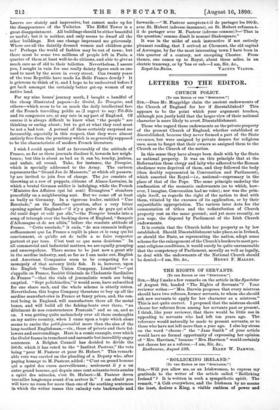LETTERS TO THE EDITOR.
CHURCH POLICY.
[To THE EDITOR OF THE " SPECTATOR."]
SIR,—Does Mr. Moggridge claim the ancient endowments of the Church of England for her if disestablished ? This. appears to be the point which your argument touches,. although you justly hold that the larger view of their national character is more likely to avert. Disestablishment.
Those who regard these endowments as the private property of the present Church of England, whether established or disestablished, because they never formed a part of the State revenues, but were assigned by private donors for religious. uses, seem to forget that their owners so assigned them to the Church as the Church of the nation.
In this sense they have always been dealt with by the State_ as national property. It was on this principle that at the Reformation those clergy and laity who adhered to the Roman obedience were deprived of them, and they followed the body (then doubly represented in Convocation and Parliament),. which asserted the Royal—i.e., national—supremacy in the place of that of the Pope. The same principle underlay the confiscation of the monastic endowments (as to which, how- ever, I imagine, Convocation had no voice) ; nor was the prin- ciple itself, as regards the right of the nation to deal with them, vitiated by the excesses of its application, or by their unjustifiable appropriation. The various later Acts for the commutation of tithes and the redistribution of Church property rest on the same ground; and yet more recently, as. you urge, the disposal by Parliament of the Irish Church endowments.
It is certain that the Church holds her property as by law established. Should Disestablishment take place, as in Ireland„ or should the State, as representing the nation, adopt some scheme for the enlargement of the Church's borders to meet pre- sent religious conditions, it would surely be quite unreasonable that the competency of Parliament, morally as well as legally, to deal with the endowments of the National Church should


































 Previous page
Previous page